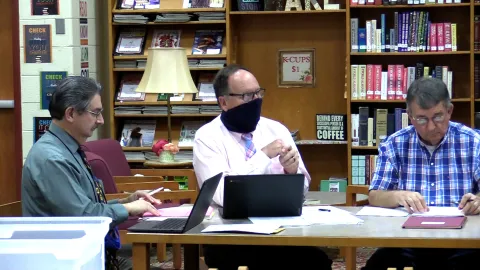School Board to use COVID-19 money to fund summer school with transportation

Dr. Carter discusses summer school plans
The impact of COVID-19 on learning, especially in elementary reading and math, continues to be a concern for Union County as well as our state and nation. To mitigate some of the pandemic's impact on learning, Dr. Jimmy Carter announced at the March Union County Board of Education meeting that summer school will be from June 1 through June 25 with a maximum class size of eighth students per teacher.
Transportation will be provided for any Union County student. Teachers will be paid $1000 per week. The summer school day will be 6.5 hours. Every school will offer summer school but students who have struggled in math and reading will be especially encouraged to attend.
During the regular school year, struggling K-3 students will continue to have the benefit of a certified teacher to provide intervention activities geared at improving reading and math and reducing learning gaps. More information will be available later in the school term regarding specific times and other details.
In addition, Carter explained that non-certified employees (custodians, support personnel, etc.) will receive a $250 bonus or incentive pay in April. An earlier bonus was approved for teachers in February for $548 that was paid in the March paycheck.
Carolyn Murr, Union County Education Association President, asked the percent of school employees who had received the vaccine. Carter estimated that 75 to 80 percent had received the vaccine at school or at the walk-in clinic.
The second shot was scheduled for before spring break. Carter noted that the one-day event saw over 300 employees vaccinated by school nurses and was “so seamless that it looked like those nurses did this every day.”
The vaccine day caused two additional distance learning days due to not knowing the exact arrival date of the vaccine.
In the Quarterly Capital Projects Report, Carter explained that $986,736 of the approximately one million dollars budget had been spent. Major projects completed include the UCHS roof ($220,000), SCES roof ($197,000), and awnings for EMAC and UCHS ($19,000).
Other projects covered a screen for the pitcher at UCHS softball field, Paulette Elementary interactive instructional boards, Chromebooks, painting UCHS, paving on Maynardville playground, and a $120,000 set-aside for repairing or replacing equipment beyond regular maintenance of which nearly $10,000 has been used to repair the HVAC at UCHS.
Plans for next year's budget include paving the student parking lot and any other paving needs at UCHS as well as paving Maynardville Elementary parking and traffic areas, and erecting a fence with a gate between UCHS and the Farmers Market.
The Board of Education had no budget amendments and only one contract to discuss. Ann Dyer informed the Board that the financial report was normal except that the cafeteria revenue has been reduced due to distance learning brought by COVID-19.
Carter commented that the cafeteria workers will be paid with emergency funding from the federal government in order to avoid a reduction in pay due to distance learning, since they delivered meals last spring when school was closed and continue to help see that students are nourished.
The ZONAR contract, which provides services for the buses including GPS and bus inspections, was approved.
In regard to pandemic emergency funding, the board amended ESSER 2.0 which was supposed to be for two years but was changed by the Tennessee Department of Education to an ending date of June 30, 2021.
The board removed the second year of salaries and moved the money to maintenance repairs and improvements. The school system received nearly four million dollars under ESSER 2.0 and expects to receive some eight million dollars under the American Rescue Plan known as ESSER 3.0 in Tennessee. Carter and his staff are working on the budget for these funds which will be spent mostly next school year.
Ronnie Mincey discussed several Tennessee School Board Association recommended changes to board policy. These changes will be further discussed on first reading at the next regular board meeting on April 8. This meeting will also cover the preliminary budget.
- Log in to post comments